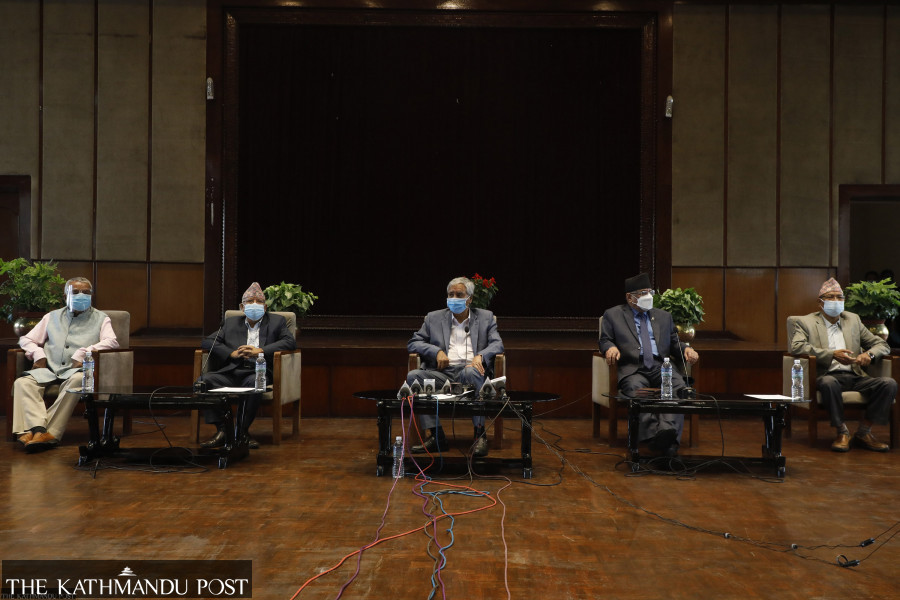Editorial
A house of cards
Nepali politics is a circus for the making and breaking of governments for petty reasons.
That the five-party coalition government formed after the ignominious ouster of the KP Sharma Oli administration had a short life span was no guesswork. The Oli administration had already expended 3.5 years even as it slowly lost steam midway. As Oli's political manoeuvres against democratic politics got worse each passing month, his government finally imploded after he dissolved the House first in December 2020 and again in May 2021. So, when Sher Bahadur Deuba came to power with the backing of Oli's former comrades—Pushpa Kamal Dahal of the Maoist Centre and Madhav Kumar Nepal of the CPN (Unified Socialist)—Deuba was expected to buttress the democratic process and work hard to ease the lives of Nepalis battered by the coronavirus pandemic. Seven months into power, the Deuba government is a house of cards.
What is different this time is that the government is on the verge of an implosion, neither due to the callous political decisions that Deuba is known for, nor due to greed for power that most Nepali political parties and leaders are known for. The thorn in the flesh this time is the Millennium Challenge Corporation compact (MCC) that has got the coalition partners bickering. When it came to power, its stated claim was to embolden Nepal's parliamentary democracy and not to argue about an international grant project. Its common minimum programme shied away from mentioning the MCC, prompting the then recently ousted prime minister KP Sharma Oli to question the Deuba government's commitment to the compact. However, as Deuba makes its ratification the unequivocal agenda of his government, the coalition has now come to an impasse.
On Wednesday, Deuba backtracked from his plan to table the MCC compact amid the Maoist Centre's strong disagreement and a threat to break the coalition. However, Prime Minister Deuba is reported to have decided to move ahead with the tabling of the compact in Parliament on Friday even as the Maoist Centre stands firm on its threat that it would withdraw from the government if an effort to ratify it is made. The Maoist Centre is emboldened in its claim by the support of the CPN (Unified Socialist), which has expressed strong opposition to the compact since the beginning. And in so doing, the party, which has changed multiple partners effortlessly in making and breaking governments in just a decade and a half of its life in democratic politics, is following a pattern that is quite familiar with those who have watched Nepal's democratic politics evolve in the past three decades.
The Maoist Centre is not particularly known to stick with its coalition partners. After all, Dahal, the party chief, has on more than one occasion hinted that he does not believe in keeping permanent friends and enemies, which he terms as part of the political game. And, as the elections come near, there is the voter base to placate notwithstanding the fact that the party chief has signed a letter expressing firm commitment to get the compact ratified through a consensus. And that is the degenerative Nepali politics at its wicked best. From the outside, Nepali politics has certainly gone through a sea change in the past three decades, more specifically after the 2006 democratic movement. However, the one thing that has remained constant and given Nepali politics a distinctive flavour is the making and breaking of governments for petty reasons. It is one thing to debate vociferously on the merits and demerits of a foreign aid grant, but the possibility of a government formed to "save democracy" being on the verge of an implosion due to differences over the funding is uncalled for.




 13.12°C Kathmandu
13.12°C Kathmandu














